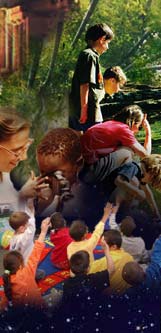 |
 |
PRESS ROOM
| | |

The University of Maryland University College
Online Magazine
March, 2004
Focus on Faculty: Mary Radnofsky
By Chip Cassano
Dr. Mary Radnofsky might not be what most think
of as the "typical" cybercrime fighter. She doesn’t spend her days
designing firewalls, or puzzling out ever-more-sophisticated data-encryption
strategies. But she may soon be at the forefront of the battle,
nonetheless.
Radnofsky, who teaches astronomy in UMUC’s School of Undergraduate
Studies and serves as president and CEO of the nonprofit Socrates
Institute, in Alexandria, Virginia, is the inspiration behind the
CyberEthics Project, an innovative approach to educating students
in grades K-12 about the costs and consequences of cybercrime.
"We’ve done a very good job of teaching most children how to use
computers, the Internet, and other technologies," said Radnofsky,
"but-as evidenced by the increase in cybercrime-we haven’t managed
to instill a very good sense of the responsible, safe, and legal
use of those technologies."
The CyberEthics Project-which Radnofsky expects to begin piloting
by the end of 2004-teaches students about cybercrime, using online
role-playing games combined with reality-style videos of actual
juvenile cybercrime cases. The strategy is underpinned by a growing
awareness that young people who are convicted of cybercrimes are
seldom what anyone would consider hardened criminals.
"Although most data on juvenile crime is kept confidential, anecdotal
evidence indicates that the majority of kids charged with cybercrimes
have never been charged with any other crimes," said Radnofsky.
"They wouldn’t knock down an old lady, steal her handbag, and run
away. They know better than to do something like that. What they
don’t understand is that going onto an Internet auction site, stealing
someone’s identity, and buying a Lear jet-something that students
did just a few weeks ago-is really the same thing."
The challenge, then, is to help young people realize that their
activities in cyberspace can have consequences-for themselves as
well as for others-and to do it by way of an educational program
with a curriculum and a game that students will find engaging.
Here, Radnofsky’s own rather eclectic educational background is
sure to be an asset. The daughter of a NASA engineer, she grew up
playing chess with Russian engineers from the Apollo-Soyuz mission,
and went on to earn degrees in English and French before completing
her Ph.D. in education and human development. While living in West
Africa, she served as secretary/librarian of cultural services at
the French embassy and taught English to students of 36 different
nationalities. She has taught Kindergarten through 12th grade, college,
and adult learners in France, Liberia, Texas, Tennessee, New York,
Virginia, Maryland, and Washington, D.C., both online and face-to-face.
She also served on the teams developing astronomy curricula for
NASA grants related to the size of the solar system and to the unmanned
MESSENGER mission to the planet Mercury.
For her, teaching young people how to keep out of "cybertrouble"
will be a piece of cake.
For more information about Mary Radnofsky’s work with the CyberEthics
Project and the Socrates Institute, visit www.socratesinstitute.org.
Other Press Releases:
| May 13, 04 |
Mar, 04 |
Nov 7, 03 |
Apr 21, 00 |
Apr 5, 00 |
| Mar 23, 00 |
Mar 13, 00 |
Mar 8, 00 |
Apr 15, 99 |
Mar 30, 99 |
| Mar 16, 99 |
Mar 6, 99 |
Oct 17,
98 |
Jun 15, 98 |
Jun 3, 98 |

CyberEthics Project
|
 |

